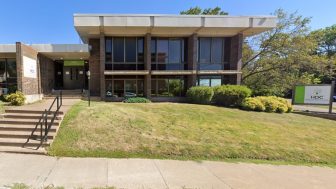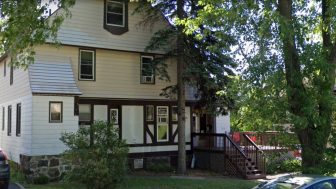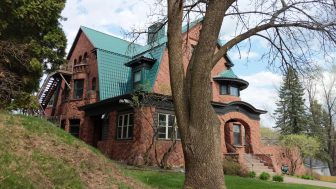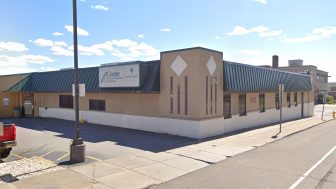Howard Friese Men’s Residential Program (Prindle)
2211 Greysolon Road
Duluth, MN 55812
About Howard Friese Men’s Residential Program (Prindle)
The Howard Friese House in Duluth, Minnesota, provides trauma responsive and personalized residential treatment for men affected by substance misuse and co-occurring disorders. This facility has 24 beds and offers a safe and comfortable setting where you can build the independent skills for lasting recovery. You can find ways to relapse prevention and build sober living skills as you prepare to reenter the community. Their interdisciplinary clinical team provides ‘round the clock support as you navigate recovery.
Services include evidence based group and individual counseling. This helps you gain self awareness, strengthen recovery skills and build healthy coping strategies. Group counseling is especially important in building sober support networks. It encourages peer interaction and sharing of ideas and experiences in a supportive environment. Sharing and learning from other people’s stories can grant you new insight into your struggle with substance misuse. You can gain valuable life skills like effective communication, managing anger and stress and solving problems. It’s also a great avenue to build healthy relationships.
Individual counseling is equally essential in helping you resolve internal conflict, trauma and negative emotions that cause you to “use.” It’s all about developing coping skills, preventing relapse and staying sober. They may incorporate motivational enhancement techniques and client engagement in their treatment model. These techniques can boost your motivation for change and keep you engaged throughout treatment. Clinical pharmacists are available to provide comprehensive medication management. This is important if you’re dealing with co-occurring conditions.
You’ll have access to psychiatric consultations and onsite medical services. You may benefit from quick access to medication assisted treatment including methadone and suboxone as well. This can be helpful if you’re dealing with opioid use disorders and alcoholism. Their staff provides service coordination to help you meet basic needs like finding appropriate employment and living arrangements. It’s expected that at the end of your stay, you’ll have built relevant independent living skills that guarantee continued lifestyle outside the program.
Amenities
Private drug rehab provides a comfortable, secure environment that allows you to focus on doing the work to get your life back on track. Benefits include a higher staff-to-client ratio, increased one-on-one time with therapists and healthcare providers, private rooms for clients, and customized forms of therapy.
In order to maintain a sense of autonomy, many private rehab facilities offer clients the ability to choose their own private rooms. The privacy and personal space ensure that the recovery process is as comfortable as possible.
Art and music are mediums that connect with our feelings, making them a great recovery tool during addiction treatment. Studies show that combining art/music and drug rehab can have a greater therapeutic impact than drug rehab alone, as you’re able to access parts of your brain and body that you may not have access to during traditional talk therapy. Benefits of art/music therapy include lowering stress and anxiety, promoting healthy neurochemicals, and providing stress relief.
Addiction Treatment Programs
Recovery is not the same for young adults as it is for older individuals. A young adult program in Minnesota treats the patient as a whole, addressing unique life-stage challenges, dual diagnosis issues, and substance abuse.
When an individual struggles with drug and alcohol use, an adult program in Minnesota can provide treatment and mental health support. Designed for men and women over the age of 18, these programs help individuals obtain and maintain sobriety.
The goal of alcohol rehab in Minnesota is to help you make mental and behavioral changes that lead to recovery and long-term sobriety. Most methods rely on a combination of group and individual counseling to accomplish these goals.
Individuals who attend men’s rehab in Minnesota can expect to spend much of their days in therapy sessions. Therapy is focused on men only, and teaches men how to control urges and cravings and live a healthy, sober lifestyle.
After evaluating your needs and budget, staff at opioid rehab in Minnesota will help you determine the length of your treatment and its intensity level, to properly address your degree of opioid dependence. Most programs include detox, addiction therapy, specialized care, and aftercare support.
Cognitive behavioral therapy in Minnesota is based on rapid, action-focused treatment. This works well for 60 to 90-day rehab programs by providing participants with immediate and effective coping techniques.
Drug rehab in Minnesota often starts with assessment. Once needs are determined, the individual typically begins treatment with detox, then enters rehab, and finally receives aftercare once the program is complete. This continuum of care offers appropriate levels of support at each stage to help the individual achieve long-term recovery.
Rational emotive behavioral therapy in Minnesota assumes that negative experiences tend to lead to irrational thoughts. These thoughts then lead to dysfunction that contributes to substance abuse. This treatment method attempts to correct irrational thoughts to encourage recovery from addiction.
Levels of Care
Detox in Minnesota involves 24/7 supervision by professionals who help you cleanse your body of all addictive substances. This process can take up to a week and may involve medication to ease withdrawal symptoms.
If you choose inpatient drug rehab in Minnesota, often referred to as residential rehab, you’ll receive 24/7 care while living at the rehab facility. Typical treatment services include individual and group therapy, medication management, and relapse prevention education.
For months or years after achieving initial sobriety, aftercare rehab in Minnesota gives you access to resources that help you maintain sobriety after treatment. You can receive support through 12-step groups, ongoing counseling, and financial coaching.
Left untreated, mental disorders complicate substance abuse disorders and make addiction treatment ineffective. Dual diagnosis treatment in Minnesota addresses both, making it ideal for those who have co-occurring disorders.



